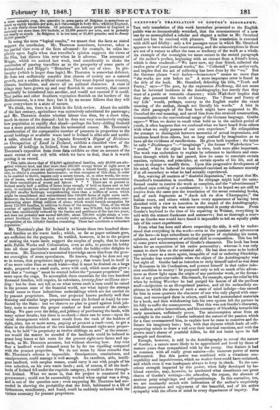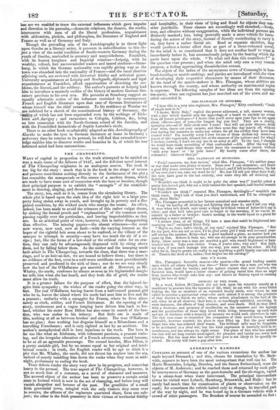OXENFORD'S TRANSLATION OF GOETIIE'S BIOGRAPHY.
THE only translation of this work heretofore presented to the English public was so inconceivably wretched, that the announcement of a new one by so accomplished a scholar and elegant a writer as Mr. Oxenford could not but he received with pleasure. This translation is executed
with skill and fidelity : only a few passages occur in which Mr. Oxenford appears to have missed the exact meaning, and the misconceptions in those are not of a nature to affect the tone or tendency of the work as a whole. An example of the oversights we mean occurs in the second paragraph of the author's preface, beginning with an extract from a friend's letter, which is thus rendered—" We have now, my dear friend, collected the
twelve parts of your poetical works," &c. "Collected" is an active verb, and implies that the act of collecting has been done by the "we." But the German phrase "wit- haben--beisannen" means no more than
"the works are now before us." A more important error is found in
the title of the book. Mr. Oxenford, defending his title, "Truth and Poetry," says—" The poet, by the expression Dichtung, did not mean
that he invented incidents in the Autobiography, but merely that they
were of a poetic or romantic character ; while Wahrheit implies that they also possessed the truth of history. The Prose and Poetry of
my Life' would, perhaps, convey to the English reader the exact meaning of the author,. though not literally his words." A hint in the third paragraph of the first book might have suggested to Mr. Oxenford the real meaning, and saved him from this strained construction, irreconcileable to the conventional usage of the German language. Goethe says—" When we desire to recall what befel us in the earliest period of youth, it often happens that we confound what we have heard Irons others
with what we really possess of our own experience." He relinquishes the attempt to distinguish between memories of actual impressions, and incidents heard from others, but so long realized by imagination as to have all the vividness of recollections. He gives both together : the latter he calls "Dichtungen"—"imagininga" ; the former " Waltrheiten"— " truths." For the object he had in view, both were alike important. The work was undertaken to explain by reference to incidents and emo- tions through which be had passed, how he came to entertain certain maxims, opinions, and principles, at certain epochs of his life, and at others to change or modify them. Upon this progressive development of his mind, what he believed he experienced exercised an influence scarcely if at all secondary to what he had actually experienced. But, waiving all matters of " doubtful disputation," we repeat that Mr. Oxenford's translation is excellent. Its titiepage might lead the unin- formed reader to receive the work as complete, and the "advertisement" prefixed says nothing of a continuation : it is to be hoped we are still to receive from the same pen the translation of the seven remaining books, and of such fragments as " Auch ich in dent Champagne," the Italian tours, and others which have every appearance of having been sketched with a view to insertion in the sequel of the Autobiography. The reason why the work was never completed is pretty obvious. From Goethe's boyhood to the time of his repairing to Weimar, everything is told with the utmost frankness and unreserve; but so thorough a °our. tier as Goethe was would have found it impossible to tell an equally plain tale of his court experiences. From what has been said above respecting the title, it will be under- stood that everything in the work—even to the passions and adventures of the hero—is kept subordinate to the purpose of explaining his tastes, opinions, and acquirement of artistical skill in composition. This has led to some grave misconceptions of Goethe's character. The book has been taken for an exposition of his entire personality; whereas it was only meant to show him on the artistical side. He has thus come to be looked upon by many as a mere egoist, incapable of real or enduring friendship. The mistake was unavoidable when the object of the Autobiography was lost sight of. Goethe had no intention to strip himself naked as was done by Rousseau in his Confessions, and present himself in that rather inde- cent condition in society he purposed only to tell so much of his adven- tures as threw light upon the origin of any particular work, or the forma- tion of any particular taste. His remark, for example, upon the relief he felt when by writing Werther he had purged his bosom of all the perilous stuff—subjection to an ill-regulated passion, and all the melancholy so- phisms in which the slaves of such a state of mind indulge—has earned for him in some quarters the character of one who only played with emo- tions, and encouraged them in others, until he had accumulated materials for a book, and then withdrawing into his own egoism left the partner in his folly to suffer the consequences. That this was not Goethe's character, his uniform active benevolence, and his constancy of friendship towards his early associates, sufficiently prove. The misconception arose from an oversight in the reader : Goethe indicated the nature of the passion which for a time overmastered him, to explain how he came to conceive and de- lineate his imaginary hero; but, with that shyness which leads all self- respecting minds to draw a veil over their internal emotions, and with the grown man's shame of youthful follies, he did not insist upon its full strength and duration. Enough, however, is told in the Autobiography to reveal the nature of Goethe ; a nature more likely to be appreciated and loved by those of mature years than sympathized with by the young. One feature it had in common with all really great natures—the immense power of stern self-control. But this power was combined with a vivacious sus- ceptibility and impulsiveness, which no weaker force could have reclaimed, and which even it was inadequate always to keep in check. To the con- scious strength imparted by this power, when fully developed by ha- bitual exercise, may, however, be attributed what constitutes one great charm of Goethe's writings—the abandon, the repose, the absence of anxious petty misgivings and self-questionings. In this narrative, too, we are constantly struck with indications of the author's exquisitely delicate perception and enjoyment of the beautiful, and of his active sympathy with the efforts of mind in every department of inquiry. Nor
less are we enabled to trace the external influences which gave impulse and direction to his pursuits,—domestic relations, the theatre, the studio, intercourse with men of all the liberal professions, acquaintance with alchemists, pietists, and philosopher, the literature of England and France as well as of Germany and Italy.
Though the pervading aim of the Autobiography is to throw light upon Goethe as a literary artist, it presents in subordination to this ob- ject a view of the social condition of South-western Germany during the youth of Goethe, unrivalled in accuracy and manysidedness. Frankfort, with its honest burghers and Imperial relations—Leipzig, with its wealthy, refined, but narrowminded traders and tamed students—Stras- burg, in which the German nationality was rapidly giving way as the town was absorbed into the nationality of France—and the rural districts adjoining each, are reviewed with historical fidelity and artistica! grace. University acquaintances at Leipzig and Studtgardt,■diplomatic and legal acquaintances at Frankfort, afford opportunities of sketching the no- blesse, the literati, and the soldiery. The author's pursuits at Leipzig lead him to introduce a masterly outline of the history of modern German lite- rature previous to his own sera. His pursuits at Strasburg suggest an equally admirable notice of the influence exercised by contemporary French and English literature upon that race of German litterateurs of whom himself was the chief ornament. To his residence at Wetzlar we .ttre indebted for a sketch of the constitutional history of Germany, the Notikity of which has not been superseded even by the writings of Bich- horn 4,--41,,Savigny ; and excursions to Cologne, Coblenz, &c., bring us into connexion with the North-German school of the Jacobis, and with the Frenchified fantasticals of Sophie Laroche's circle. There is no other book so admirably adapted as this Autobiography of Goethe to make the tyro in German literature at home in Germany ; and every time he returns to its perusal, he will find that extended know- ledge enables him to discover truths and beauties in it, of which his less informed mind had been unconscious.



























 Previous page
Previous page